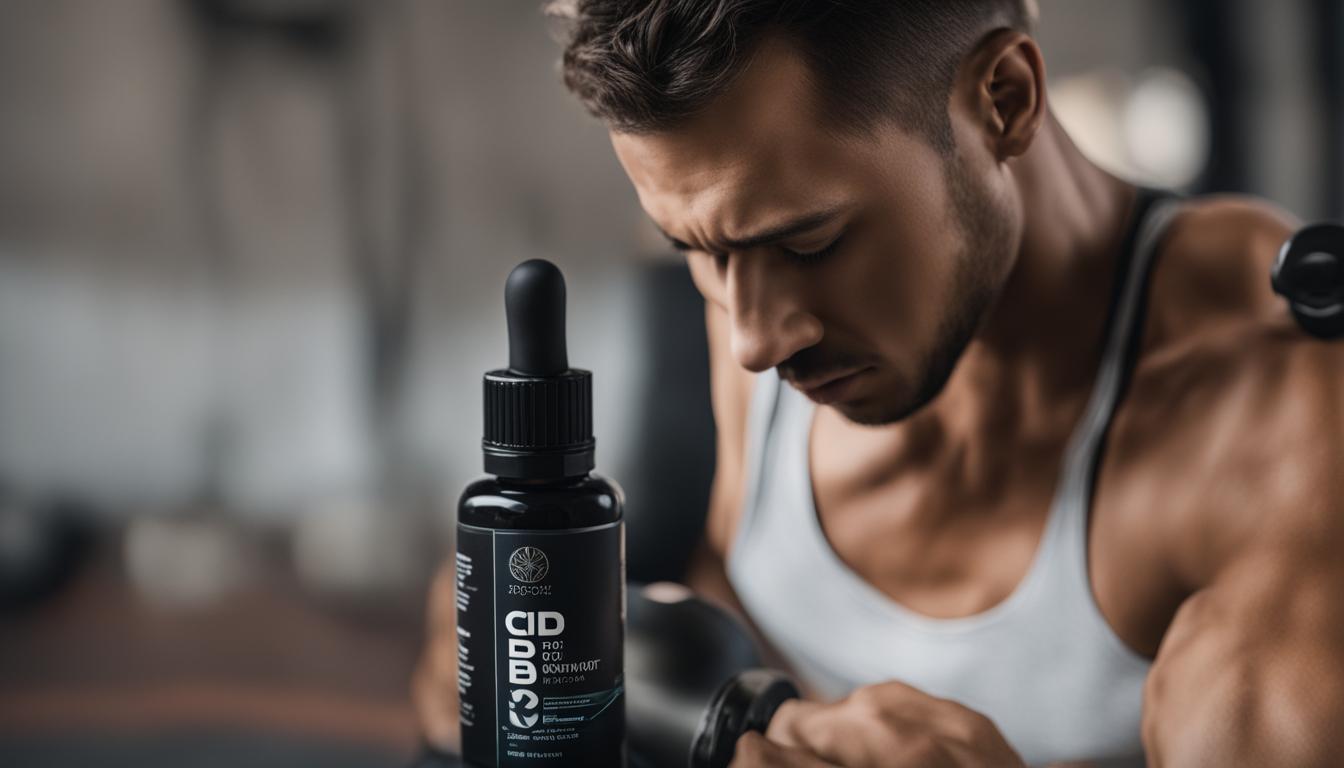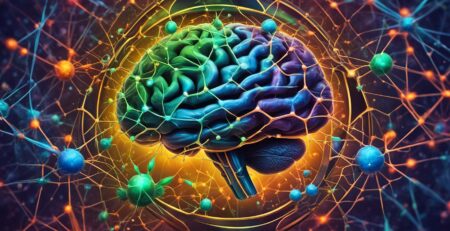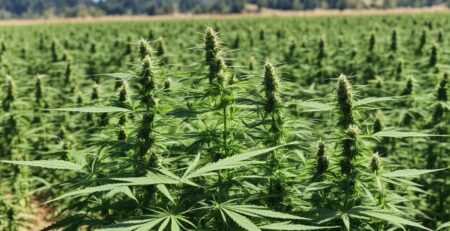Discover the Role of CBD in Post-Workout Recovery Today
As athletes, we are constantly seeking ways to optimize our performance and enhance our recovery after intense workouts. One emerging trend in the fitness world is the use of CBD, or cannabidiol, as a potential aid in post-workout recovery. CBD has garnered attention for its potential benefits in muscle recovery, reducing inflammation, and promoting faster healing. In this article, we will explore the impact of CBD on exercise recovery and delve into its potential role in post-workout inflammation, muscle repair, and overall recovery. Let's discover how CBD can benefit our post-workout routines and aid in our journey towards peak performance.
Key Takeaways:
- CBD shows promise in aiding post-workout recovery, with potential benefits in muscle recovery, inflammation reduction, and faster healing.
- Using CBD after working out may help alleviate post-workout inflammation and promote faster muscle repair.
- Further research is needed to fully understand CBD's role in exercise recovery and determine specific recommendations for its use.
- Exploring the potential benefits of CBD in post-workout recovery may provide new strategies for athletes and individuals looking to optimize their performance.
- Consider incorporating CBD into your post-workout routine to potentially experience relief from muscle soreness and support your recovery process.
The Importance of Recovery in Sports Performance
Recovery plays a crucial role in sports performance. It is essential to restore physical, physiological, and cognitive functions after exercise to maintain optimal performance and overall well-being. Fatigue and muscle damage are common consequences of intense physical activity, which can negatively impact an athlete's performance. Therefore, incorporating effective recovery strategies is vital to facilitate the necessary physiological adjustments and promote optimal recovery.
Recovery encompasses various aspects, including the restoration of physical fatigue, such as muscle soreness and tiredness, as well as the recovery of physiological functions, such as inflammation reduction and muscle repair. Additionally, cognitive performance, such as concentration and decision-making abilities, also plays a significant role in sports performance and should be considered in the recovery process.
The Significance of Functional Capacities
Achieving full recovery involves restoring functional capacities, which refer to an athlete's ability to perform at their optimal level. Functional capacities encompass different aspects, including strength, power, flexibility, and endurance. Effective recovery strategies aim to identify, monitor, and control the adjustments required to optimize recovery and restore these functional capacities.
There are two primary types of fatigue that athletes commonly experience: central fatigue and peripheral fatigue. Central fatigue refers to a decrease in the central nervous system's ability to activate muscles, leading to reduced force generation. Peripheral fatigue, on the other hand, is the result of physiological changes within the muscles themselves, such as impaired energy production or accumulation of metabolic byproducts. Understanding these different types of fatigue is crucial in developing targeted recovery strategies.
Overall, recognizing the importance of recovery in sports performance is essential for athletes to achieve their full potential. Implementing effective recovery strategies that address physical fatigue, physiological adjustments, and cognitive performance can significantly contribute to enhanced performance and reduced risk of injury.
The Potential Benefits of CBD in Exercise Recovery
The use of CBD in exercise recovery has gained significant attention in recent years. CBD, or cannabidiol, is a compound derived from the cannabis plant that is known for its potential health benefits. In the context of exercise recovery, CBD has been studied for its anti-inflammatory and analgesic properties, making it a potential aid in reducing fatigue and muscle damage.
One of the key potential benefits of CBD in exercise recovery is its ability to combat inflammation. Intense physical exertion can lead to inflammation in the muscles, causing pain and discomfort. CBD has been shown to have anti-inflammatory effects, which may help to reduce post-workout inflammation and promote faster recovery.
In addition to its anti-inflammatory properties, CBD may also have a positive impact on oxidative stress. Exercise can increase oxidative stress in the body, which can contribute to muscle fatigue and damage. CBD's antioxidant properties may help to mitigate the effects of oxidative stress, supporting the recovery process.
While there is still much research to be done to fully understand the effects of CBD on exercise recovery, early studies and anecdotal evidence suggest that CBD may have the potential to aid in reducing fatigue and muscle damage. Incorporating CBD into a post-workout recovery routine may be worth exploring for individuals looking to optimize their recovery and enhance their overall exercise performance.
Table: Potential benefits of CBD in exercise recovery
| Benefit | Description |
|---|---|
| Reduces inflammation | CBD's anti-inflammatory properties may help to reduce inflammation in the muscles, promoting faster recovery. |
| Alleviates muscle pain | CBD's analgesic properties can help to alleviate muscle pain and soreness after intense exercise. |
| Supports muscle repair | By reducing inflammation and oxidative stress, CBD may support the repair and regeneration of damaged muscle tissue. |
| Reduces fatigue | CBD has the potential to reduce exercise-induced fatigue, allowing for faster recovery and improved performance. |
| Aids in relaxation | CBD may promote relaxation and stress relief, helping athletes to recover both physically and mentally. |
It's important to note that CBD is not a magic solution for exercise recovery. It should be used in conjunction with other recovery strategies, such as proper nutrition, hydration, and adequate rest. Additionally, individual responses to CBD may vary, and consulting with a healthcare professional is recommended before incorporating CBD into your exercise recovery routine.
Overall, CBD shows promise as a potential aid in exercise recovery. Its anti-inflammatory and analgesic properties, along with its potential to reduce fatigue and promote relaxation, make it an intriguing option for athletes and fitness enthusiasts. However, more research is needed to fully understand the mechanisms of action and optimal dosage of CBD in exercise recovery.
CBD Oil: An Introduction
CBD oil is a popular cannabinoid extraction derived from the cannabis plant. It is obtained from industrial hemp and often combined with a carrier oil. CBD oil offers various therapeutic uses and is known for its non-psychoactive effects, meaning it does not cause a “high” sensation like THC, another compound found in cannabis. This makes CBD oil a desirable option for those seeking the potential health benefits of cannabis without the psychoactive effects.
There are several therapeutic uses for CBD oil, making it a versatile supplement. It has shown potential as a sleep aid, assisting individuals in achieving better sleep quality and duration. CBD oil has also been studied for its potential benefits in managing psychological disorders such as anxiety and depression. Additionally, it may have positive effects on neurological disorders, chronic pain, and heart health. These therapeutic properties of CBD oil have led to its widespread use and exploration in various health contexts.
| Therapeutic Uses | Health Benefits |
|---|---|
| Sleep Aid | Improved sleep quality and duration |
| Psychological Disorders | Reduced symptoms of anxiety and depression |
| Neurological Disorders | Potential benefits in managing seizures |
| Chronic Pain | Alleviation of persistent pain |
| Heart Health | Potential benefits for cardiovascular health |
It's important to note that while CBD oil has exhibited promising therapeutic uses and health benefits, further research is needed to fully understand its potential and develop specific guidelines for its use. It's always recommended to consult with a healthcare professional before incorporating CBD oil into your wellness routine to ensure it aligns with your individual needs and circumstances.
How CBD Oil Aids in Workout Recovery
CBD oil has gained significant attention for its potential role in aiding workout recovery. Many athletes and fitness enthusiasts have turned to CBD to help alleviate post-workout soreness and promote overall wellness. The anti-inflammatory properties of CBD have been shown to reduce inflammation, which can contribute to muscle soreness and fatigue.
Studies have also suggested that CBD may enhance mobility and reduce fatigue, allowing individuals to push through intense workouts more easily. This can be particularly beneficial for athletes and those engaged in high-intensity training. Additionally, CBD has been found to have an anxiolytic effect, helping to relieve anxiety and stress, which can improve performance during workouts.
Furthermore, CBD's impact on oxygen levels may provide additional benefits for exercise recovery. Oxygen plays a crucial role in energy production and muscle function. By optimizing oxygen delivery to the body, CBD may enhance performance and reduce the risk of exercise-induced fatigue.
| Benefits of CBD Oil for Workout Recovery |
|---|
| Reduces post-workout soreness |
| Anti-inflammatory properties aid in reducing inflammation |
| Enhances mobility and reduces fatigue |
| Relieves anxiety, promoting a successful workout |
| Optimizes oxygen levels for improved performance |
It's important to note that individual experiences with CBD may vary, and more research is needed to fully understand its effects on workout recovery. Additionally, it is essential to consult with a healthcare professional before incorporating CBD oil into your fitness routine, especially if you have any underlying medical conditions or are taking other medications.
Other Effects of CBD Oil on Workouts
CBD oil can have additional effects on workouts. In addition to its potential benefits in reducing post-workout soreness and inflammation, CBD also has the ability to reduce anxiety and boost confidence during exercise. This can be particularly helpful for individuals who experience performance anxiety or struggle with maintaining focus and motivation during their workouts. By promoting a state of calm and relaxation, CBD oil can create a more positive and enjoyable gym experience, allowing individuals to push themselves further and achieve their fitness goals.
Furthermore, CBD oil may have an impact on oxygen delivery during exercise. Some preliminary studies suggest that CBD may improve oxygenation and enhance endurance levels, resulting in improved performance and reduced fatigue. This is particularly promising for athletes who engage in endurance-based activities such as long-distance running or cycling.
Another advantage of CBD oil is its potential as an alternative to other supplements commonly used for exercise recovery. Many athletes and fitness enthusiasts turn to various supplements to support their recovery, including protein powders, BCAAs, and pre-workout formulas. However, CBD oil offers a natural and holistic option that may provide similar benefits without the potential side effects associated with some supplements.
Overall, CBD oil has the potential to enhance various aspects of workouts, including reducing anxiety, improving oxygen delivery, and serving as an alternative to traditional supplements. However, it is important to note that individual experiences may vary, and further research is needed to fully understand the effects of CBD on exercise performance and recovery.
Side Effects and Precautions of CBD Oil
While CBD oil has many potential benefits, it is important to be aware of possible side effects and take necessary precautions. It is crucial to discuss CBD use with a healthcare professional, especially if you have any pre-existing medical conditions or are taking other medications. Here are some of the side effects that have been reported:
- Nausea: Some individuals may experience feelings of nausea after consuming CBD oil.
- Blood Thinning Effects: CBD oil can have the potential to thin the blood, so it is important to be cautious if you have bleeding disorders or are taking blood-thinning medications.
- Increased Fatigue: CBD oil may cause feelings of increased fatigue or drowsiness, so it is important to avoid activities that require mental alertness until you know how your body responds to it.
- Irritability: Some individuals may experience irritability or changes in mood after using CBD oil.
- Impact on Liver-Related Blood Tests: CBD oil can impact certain liver enzymes, which may show up on liver function tests, so it is important to monitor liver function if you are using CBD oil regularly.
- Potential Unknown Elements in CBD Products: It is crucial to purchase CBD products from reputable sources to ensure their quality and avoid any potential unknown or harmful elements.
- Dry Mouth: One common side effect of CBD oil is dry mouth, which can be relieved by staying hydrated and drinking plenty of water.
- Diarrhea: In some cases, CBD oil may cause gastrointestinal issues such as diarrhea, so it is important to start with a low dosage and gradually increase if needed.
- Reduced Appetite: CBD oil may also affect appetite, causing a decrease in hunger for some individuals.
It is vital to remember that everyone's body reacts differently to CBD oil, and these side effects may vary from person to person. If you experience any severe or persistent side effects, it is recommended to discontinue use and consult a healthcare professional.
“CBD oil has many potential health benefits, but it is essential to be aware of potential side effects and consult with a healthcare professional before using it.”
We always prioritize your health and well-being. If you have any concerns or questions about CBD oil or its potential side effects, please don't hesitate to reach out to us. We are here to support you on your health journey.
Takeaways:
- Discuss CBD oil use with a healthcare professional.
- Some reported side effects include nausea, blood thinning effects, increased fatigue, irritability, and impact on liver-related blood tests.
- Be cautious when using CBD oil if you have pre-existing medical conditions or are taking other medications.
- Purchase CBD products from reputable sources to avoid potentially unknown or harmful elements.
- Monitor your body's response to CBD oil and discontinue use if you experience severe or persistent side effects.
Table: Summary of CBD Oil Side Effects and Precautions
| Side Effects | Precautions |
|---|---|
| Nausea | Avoid CBD oil if you experience severe nausea |
| Blood Thinning Effects | Consult with a healthcare professional if you have bleeding disorders or take blood-thinning medications |
| Increased Fatigue | Avoid activities requiring mental alertness until you know how your body responds |
| Irritability | Monitor your mood and discontinue use if irritability persists |
| Impact on Liver-Related Blood Tests | Regularly monitor liver function if you use CBD oil regularly |
| Potential Unknown Elements in CBD Products | Purchase CBD products from reputable sources to ensure quality |
| Dry Mouth | Stay hydrated and drink plenty of water |
| Diarrhea | Start with low dosage and gradually increase if needed |
| Reduced Appetite | Be aware of changes in hunger and nutrition |
Cannabis and Exercise Recovery: Survey Findings
A recent survey conducted on the use of cannabis for exercise recovery revealed interesting insights into the perceived benefits of cannabis, including CBD and THC, in aiding recovery. Participants who regularly engage in exercise reported various motives for cannabis use, including pain management, anxiety reduction, and improved sleep. While these findings are subjective and more research is needed to validate the claims, they provide valuable insights into the potential role of cannabis in exercise recovery.
The survey found that a majority of individuals who use cannabis and engage in exercise perceive that it aids in their recovery. This perception is particularly relevant for those seeking pain relief, as cannabis, particularly CBD, is known for its analgesic properties. By reducing pain perception, cannabis may facilitate better recovery and allow individuals to resume their exercise routines more comfortably. Additionally, participants reported experiencing reduced anxiety and improved sleep, both of which are essential for optimal exercise recovery and overall well-being.
It is worth noting that the survey did not differentiate between the use of CBD and THC, which are two prominent cannabinoids found in cannabis. CBD is known for its therapeutic properties without the psychoactive effects associated with THC. Therefore, it is likely that the perceived benefits reported by participants stem from the use of CBD rather than THC. However, further research is needed to understand the specific contributions of each cannabinoid in exercise recovery.
Table: Motives for Cannabis Use in Exercise Recovery
| Motives | Percentage of Participants |
|---|---|
| Pain management | 72% |
| Anxiety reduction | 56% |
| Improved sleep | 64% |
It's important to recognize that cannabis use may have potential drawbacks and side effects that should be considered. While the survey focused on perceived benefits, it is crucial to consult with a healthcare professional before incorporating cannabis into an exercise recovery routine. Additionally, the legal status of cannabis varies across jurisdictions, so individuals should familiarize themselves with local laws and regulations before use.
In conclusion, the survey findings highlight the potential benefits of cannabis, particularly CBD, in exercise recovery. Participants reported motives such as pain management, anxiety reduction, and improved sleep, indicating that cannabis may play a role in aiding recovery. Nevertheless, further research is needed to validate these findings and gain a deeper understanding of the specific mechanisms by which cannabis contributes to exercise recovery. Individuals considering cannabis use for exercise recovery should consult with healthcare professionals and adhere to local regulations.
Conclusion
After exploring the potential benefits of CBD in exercise recovery, we can conclude that CBD shows promise in aiding post-workout recovery. Its anti-inflammatory properties, pain-relieving effects, and potential to promote better sleep make it an attractive option for individuals looking to optimize their recovery process. While more research is needed to fully understand CBD's role in exercise recovery and establish specific guidelines for its use, many athletes and regular exercisers report positive effects from incorporating CBD into their recovery routine.
Furthermore, CBD's potential benefits extend beyond physical recovery. Its ability to reduce anxiety and enhance overall well-being can also contribute to a successful workout experience. CBD may promote a sense of calmness and confidence, allowing individuals to perform at their best without unnecessary stress or distractions.
In terms of future research directions, it is crucial to investigate the physiological pathways through which CBD exerts its effects on exercise recovery. Understanding the mechanisms involved will not only provide valuable insights but also help determine optimal dosages, timing, and formulations for CBD products. Additionally, exploring the potential synergistic effects of CBD with other recovery modalities, such as stretching or cryotherapy, could uncover new strategies for maximizing recovery and performance.

Overall, the potential benefits of CBD in exercise recovery make it a topic worthy of further investigation. As more research emerges, we hope to gain a deeper understanding of CBD's role in optimizing recovery and supporting individuals in their pursuit of physical fitness and well-being.
Ancillary Recovery Modalities
In addition to CBD, there are various other recovery modalities that can assist in exercise recovery. These modalities aim to reduce muscle damage, inflammation, and fatigue, promoting faster recovery and enhanced performance. Some of the commonly used ancillary recovery modalities include:
- Stretching: Stretching exercises help improve flexibility, increase range of motion, and reduce the risk of injury.
- Heat Therapy: Heat therapy, such as hot tubs and saunas, can help relax muscles, improve circulation, and alleviate muscle stiffness.
- Foam Rolling: Foam rolling is a self-myofascial release technique that targets tight muscles and fascia to improve mobility and reduce muscle tension.
- Electrical Stimulation: Electrical stimulation is used to activate muscles and promote muscle recovery, reducing muscle soreness and improving muscle function.
- Compression Garments: Compression garments, like compression socks or sleeves, help improve blood flow and reduce muscle fatigue during and after exercise.
- Cryotherapy: Cryotherapy involves exposing the body to cold temperatures to reduce inflammation, decrease muscle soreness, and promote faster recovery.
- Contrast Water Bath: Contrast water baths involve alternating between hot and cold water to enhance circulation, reduce inflammation, and promote recovery.
- Cold-Water Immersion: Cold-water immersion, also known as ice baths, can help reduce muscle swelling, relieve pain, and enhance recovery after intense exercise.
These ancillary recovery modalities can be used in combination with CBD and other recovery strategies to optimize the recovery process. However, it is important to note that the effectiveness of these modalities may vary depending on individual preferences and specific recovery needs.
Incorporating a variety of recovery modalities into your post-workout routine can help support your overall well-being and improve your athletic performance. Consulting with a healthcare professional or a qualified fitness trainer can help you determine which modalities are best suited for your specific needs and goals.
| Recovery Modality | Benefits |
|---|---|
| Stretching | – Improved flexibility – Increased range of motion – Reduced risk of injury |
| Heat Therapy | – Muscle relaxation – Improved circulation – Alleviation of muscle stiffness |
| Foam Rolling | – Improved mobility – Reduced muscle tension – Enhanced recovery |
| Electrical Stimulation | – Muscle activation – Reduced muscle soreness – Improved muscle function |
| Compression Garments | – Improved blood flow – Reduced muscle fatigue – Enhanced recovery |
| Cryotherapy | – Reduced inflammation – Decreased muscle soreness – Faster recovery |
| Contrast Water Bath | – Enhanced circulation – Reduced inflammation – Promoted recovery |
| Cold-Water Immersion | – Reduced muscle swelling – Pain relief – Enhanced recovery |
Chicago Athletic Clubs: Supporting Your Health Journey
In your fitness journey, prioritizing your health is essential. At Chicago Athletic Clubs, we understand the importance of creating a supportive environment for individuals to achieve their health and fitness goals. Whether you're a beginner or a seasoned fitness enthusiast, we have the resources and expertise to guide you every step of the way.
Our experienced team of trainers and instructors is dedicated to helping you reach your full potential. With personalized training sessions, you can tailor your workouts to suit your specific needs and preferences. Our group fitness classes offer a fun and energetic atmosphere, allowing you to stay motivated while working out with like-minded individuals.
If you're looking to find balance and improve flexibility, our yoga classes provide a perfect opportunity to quiet your mind and strengthen your body. Our certified yoga instructors will guide you through various poses and breathing techniques, promoting mindfulness and relaxation.
At Chicago Athletic Clubs, we believe that your health is worth prioritizing. Join us and embark on a fitness journey that not only enhances your physical well-being but also supports your overall health and happiness.
FAQ
What is the role of CBD in post-workout recovery?
CBD has the potential to help with fatigue and muscle damage related to physical exertion. It may assist in reducing inflammation and promoting faster muscle repair.
Why is recovery important in sports performance?
Recovery is crucial for restoring physical, physiological, and cognitive functions after exercise. It helps optimize performance by reducing fatigue, muscle damage, and inflammation.
What are the potential benefits of CBD in exercise recovery?
CBD may have anti-inflammatory, antioxidative, and analgesic properties that can aid in reducing inflammation, relieving pain, and promoting better sleep.
What is CBD oil and its uses?
CBD oil is a cannabinoid extracted from the cannabis plant. It has various therapeutic uses, including as a sleep aid, for anxiety and depression, neurological disorders, chronic pain, and heart health.
How does CBD oil aid in workout recovery?
CBD oil may help reduce post-workout soreness and inflammation due to its anti-inflammatory properties. It may also improve mobility, reduce fatigue, and impact oxygen levels, enhancing exercise performance.
What other effects does CBD oil have on workouts?
CBD oil can reduce anxiety, boost confidence, enhance oxygen delivery, and provide an energy boost during workouts.
Are there any side effects or precautions of using CBD oil?
Possible side effects include nausea, increased fatigue, irritability, abnormalities in liver-related blood tests, dry mouth, diarrhea, and reduced appetite. It is important to discuss CBD use with a doctor and be aware of potential interactions with other medications.
What are the findings about cannabis and exercise recovery?
A survey found that individuals who use cannabis, including CBD and THC, and regularly exercise perceive benefits in their exercise recovery. Motives for cannabis use included pain management, anxiety reduction, and improved sleep.
What are other recovery modalities in addition to CBD?
Other recovery modalities include stretching, heat therapy, foam rolling, electrical stimulation, compression garments, cryotherapy, contrast water baths, and cold-water immersion.
How can Chicago Athletic Clubs support my health journey?
Chicago Athletic Clubs offer personal training, group fitness classes, and yoga classes to support your fitness and health goals in a supportive environment.
Source Links
- https://www.chicagoathleticclubs.com/blog/benefits-of-cbd-oil
- https://www.ncbi.nlm.nih.gov/pmc/articles/PMC8369499/
- https://www.ncbi.nlm.nih.gov/pmc/articles/PMC10403841/











Leave a Reply